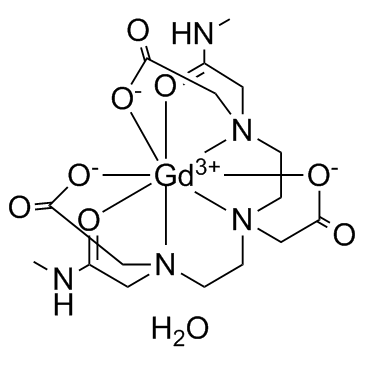CHEMICAL IDENTIFICATION
-
RTECS NUMBER :
-
LW3937500
-
CHEMICAL NAME :
-
Gadolinium, aqua(5,8-bis(carboxymethyl)-11-(2-(methylamino)-2-oxo ethyl)- 3-oxo-2,5,8,11-tetraazatridecan-13-oato(3-))-, hydrate
-
CAS REGISTRY NUMBER :
-
122795-43-1
-
LAST UPDATED :
-
199607
-
DATA ITEMS CITED :
-
1
-
MOLECULAR FORMULA :
-
C16-H28-Gd-N5-O9.xH2-O
-
MOLECULAR WEIGHT :
-
717.88
HEALTH HAZARD DATA
ACUTE TOXICITY DATA
-
TYPE OF TEST :
-
TDLo - Lowest published toxic dose
-
ROUTE OF EXPOSURE :
-
Intravenous
-
DOSE :
-
16269 mg/kg
-
SEX/DURATION :
-
female 7-17 day(s) after conception
-
TOXIC EFFECTS :
-
Reproductive - Effects on Newborn - viability index (e.g., # alive at day 4 per # born alive) Reproductive - Effects on Newborn - biochemical and metabolic
-
REFERENCE :
-
TOXID9 Toxicologist. (Soc. of Toxicology, Inc., 475 Wolf Ledge Parkway, Akron, OH 44311) V.1- 1981- Volume(issue)/page/year: 14,78,1994
|
